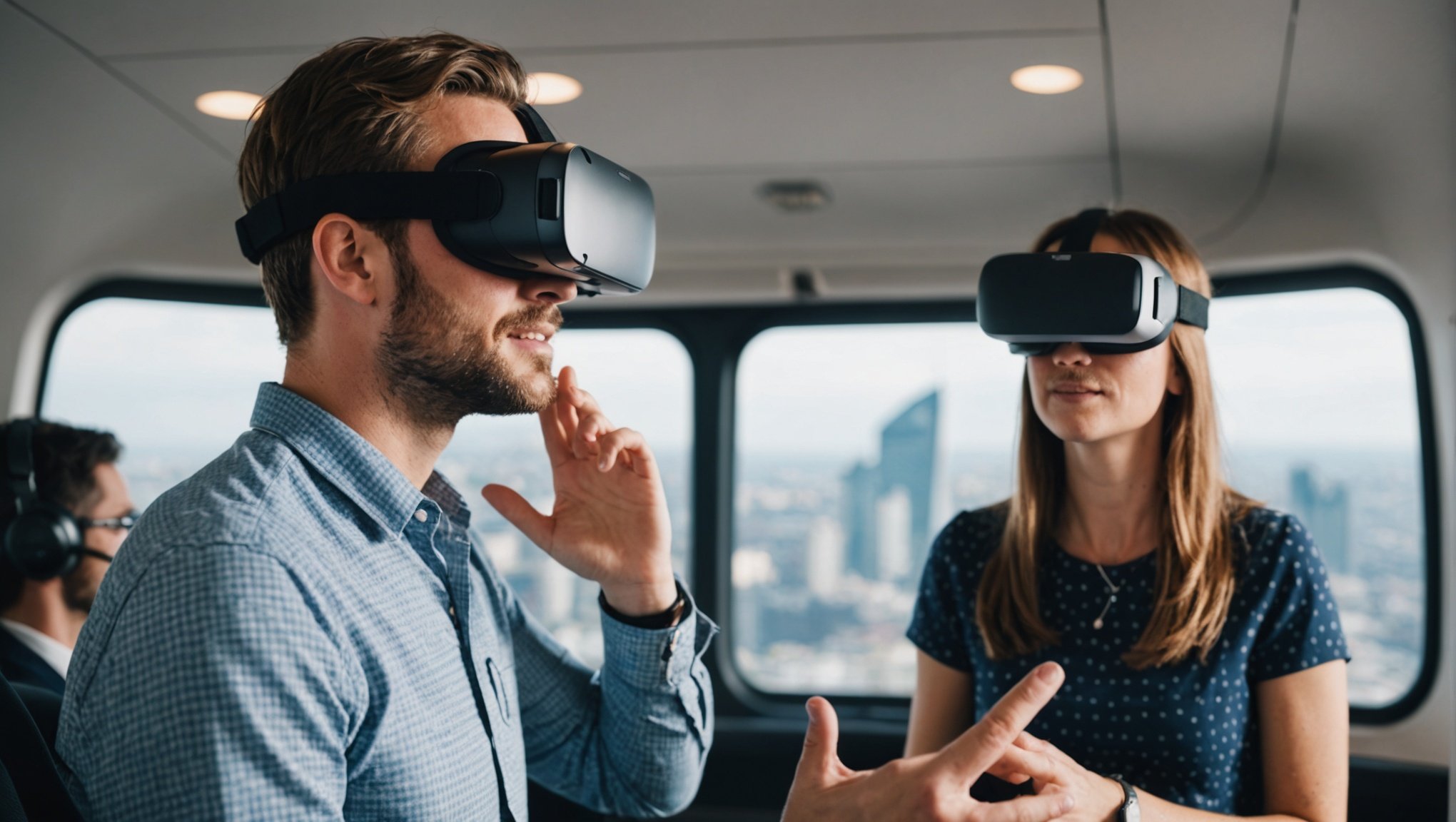Exploring the Future of Travel: How UK Agencies Can Leverage Virtual Reality for Unforgettable Pre-Trip Experiences
The Rise of Virtual Reality in the Travel Industry
The travel industry is on the cusp of a revolution, driven by the integration of cutting-edge technologies like virtual reality (VR) and augmented reality (AR). These innovations are transforming the way travelers plan, experience, and interact with their destinations. For UK travel agencies, embracing VR can be a game-changer, offering a unique way to provide immersive pre-trip experiences that set them apart from the competition.
How Virtual Reality Enhances Travel Planning
Virtual reality is no longer just a novelty; it has become a powerful tool in the travel industry. Travelers can now take virtual tours of hotels, tourist attractions, and even entire cities before booking their trips. This “try before you buy” approach allows potential customers to experience a destination from the comfort of their homes, sparking emotional connections and deeper engagement with the travel brand.
Also to read : Smart strategies for housekeeping departments to cut costs
For instance, VR tours can include virtual hotel tours, allowing travelers to explore rooms, amenities, and surroundings in detail. This can significantly influence their booking decisions, as they get a realistic preview of what to expect. Similarly, virtual tours of landmarks, national parks, or specific activities can help travelers visualize their trip and make more informed choices[2].
Creating Immersive Experiences with Virtual Reality
One of the key benefits of VR in travel is its ability to create immersive experiences that simulate the real world. Here are some ways UK agencies can leverage VR to create unforgettable pre-trip experiences:
This might interest you : Leveraging Blockchain Technology: A Guide for UK Startups to Boost Transparency in Business Operations
Virtual Tours and 360-Degree Videos
- Hotel Tours: Allow travelers to explore hotel rooms, lobbies, and amenities in detail.
- Destination Previews: Provide 360-degree videos of popular tourist spots, enabling travelers to get a feel for the place before they arrive.
- Activity Simulations: Offer virtual simulations of activities like hiking, skiing, or scuba diving to give travelers a taste of what they can expect.
Interactive Content
- Guided Tours: Create interactive guided tours that provide historical and cultural context about the destinations.
- Real-Time Interactions: Allow travelers to interact with virtual guides or other travelers in real-time, enhancing the sense of community and engagement.
Personalized Experiences
- Customized Itineraries: Use AI to create personalized itineraries based on travelers’ preferences and previous behaviors.
- Real-Time Recommendations: Provide real-time recommendations for places to visit, eat, or shop based on the traveler’s current location and interests[2].
The Role of Augmented Reality in Enhancing Travel Experiences
While VR immerses users in a completely computer-generated environment, augmented reality (AR) enhances the real world with computer-generated elements. Here’s how AR can complement VR in creating a holistic travel experience:
Augmenting Real-World Experiences
- Local Information: Use AR to display information about local destinations as travelers point their smartphones at them.
- Entertainment: Provide AR filters and effects for photographs, or create interactive AR experiences such as scavenger hunts and self-directed tours[1].
Practical Applications
- Wayfinding and Navigation: Implement AR-based wayfinding solutions to help travelers navigate unfamiliar destinations.
- Cultural Storytelling: Use AR to provide cultural and historical context about the places travelers visit, making the experience more informative and engaging[3].
Integrating Virtual Reality into Marketing Strategies
For UK travel agencies, integrating VR into their marketing strategies can be a powerful way to attract and retain customers. Here are some strategies to consider:
Virtual Reality Marketing Campaigns
- Emotional Connections: Create VR experiences that evoke strong emotional responses, such as a virtual tour of a breathtaking natural wonder.
- Social Media Engagement: Share VR content on social media platforms to engage potential customers and encourage sharing and interaction.
Event Marketing
- Virtual Events: Host virtual events and webinars that allow potential travelers to experience destinations in a more immersive way.
- Trade Shows: Use VR to showcase destinations at trade shows, providing attendees with a unique and memorable experience[2].
The Impact of Artificial Intelligence on Travel Planning
Artificial intelligence (AI) is another technology that is revolutionizing the travel industry. Here’s how AI can enhance the travel planning process and complement VR experiences:
AI-Powered Personalization
- Tailored Recommendations: Use AI to offer personalized travel recommendations based on travelers’ preferences, previous behaviors, and real-time data.
- Real-Time Adjustments: Allow AI to adjust travel plans in real-time to account for disruptions such as flight delays or weather changes[2].
Automation and Efficiency
- Automated Booking: Implement AI-driven automation for booking, payment systems, and customer service chatbots.
- Biometric Check-ins: Use AI to enhance biometric check-ins and automated security checks, reducing waiting times and improving traveler satisfaction[2].
Practical Insights and Actionable Advice for UK Agencies
To leverage VR effectively, UK travel agencies need to consider several practical aspects:
Investing in the Right Technology
| Technology | Description | Benefits |
|---|---|---|
| VR Headsets | High-quality VR headsets for immersive experiences | Enhanced customer engagement, increased bookings |
| Mobile Apps | Mobile apps compatible with VR technology | Accessibility, convenience for travelers |
| AI Tools | AI tools for personalization and automation | Tailored recommendations, efficient operations |
| Biometric Systems | Biometric systems for check-ins and security | Enhanced security, reduced waiting times |
Creating Engaging Content
- High-Quality Visuals: Invest in high-quality visuals and interactive content to make VR experiences engaging.
- User Feedback: Collect user feedback to continuously improve and personalize VR experiences.
Training Staff
- VR Training: Train staff on how to use VR technology effectively to enhance customer interactions.
- AI Integration: Educate staff on how AI can be integrated into the travel planning process to offer better services.
Real-World Examples and Success Stories
Several companies are already leveraging VR and AI to transform their travel offerings. Here are a few examples:
United Airlines
United Airlines has introduced interactive, personalized content that delivers targeted ads and promotions based on passenger preferences. This includes VR experiences that allow passengers to explore destinations before their trip[2].
Expedia Group
Expedia Group has harnessed AI to enhance customer service through real-time recommendations and virtual assistance. They also use VR to provide immersive previews of travel destinations, helping travelers make more informed decisions[4].
The Future of Travel: Sustainability and Collaboration
As the travel industry continues to evolve, sustainability and collaboration are becoming increasingly important. Here’s how VR and AI can contribute to a more sustainable and collaborative future:
Sustainability
- Environmental Impact: Use AI to analyze and reduce environmental impact by managing over-tourism and recommending off-peak travel.
- Resource Conservation: Implement AI-powered monitoring systems to help destinations track and manage their carbon footprints more effectively[4].
Collaboration
- Global Partnerships: Foster partnerships between governments, private sector players, and tech companies to ensure the responsible use of AI and VR.
- Industry Standards: Set new standards for sustainability and innovation, powered by AI and global partnerships, as emphasized by Julia Simpson, President and CEO of the World Travel and Tourism Council[4].
The future of travel is undoubtedly digital, and UK travel agencies that embrace technologies like VR, AR, and AI will be at the forefront of this revolution. By creating immersive pre-trip experiences, personalizing travel planning, and integrating these technologies into their marketing strategies, agencies can offer unparalleled value to their customers.
As Mr. Anup Kumar Keshan noted during the World Travel Market London Summit, “Tourism ministers from 20 countries shared their perspectives on AI in the travel industry, highlighting both its benefits and challenges.” This underscores the importance of collaboration and responsible innovation in shaping the future of the travel industry[4].
In conclusion, the integration of virtual reality and other cutting-edge technologies is not just a trend; it is a necessity for any travel agency looking to thrive in the modern travel landscape. By leveraging these technologies, UK agencies can create unforgettable pre-trip experiences, enhance customer satisfaction, and drive business growth in a sustainable and responsible manner.












